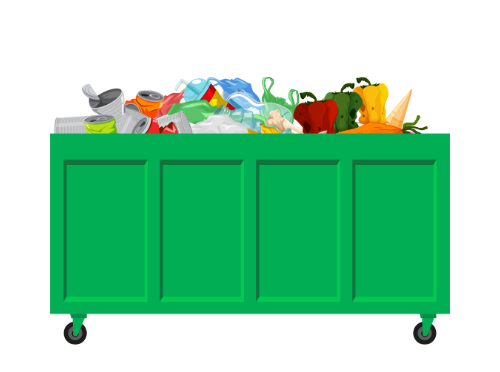One-third of all food goes uneaten in the United States, according to the Environmental Protection Agency (EPA). An estimated 96% of households’ wasted food found its way into landfills, combustion facilities, or down the drain and into the sewer system. Only an estimated four-percent was composted.
According to the EPA, 10.2% of American households were food insecure at some point during 2021.
The 2023 County Health Rankings show that 13% of Cambria County residents and 11% of Somerset County residents are food insecure. Both counties have a higher rate of food insecurity than Pennsylvania, which is 9%. Cambria County has a higher rate of food insecurity than the United States, which is 12%.
The EPA estimates that an average family of four spends about $1,500 per year on food that is uneaten. As prices for food are increasing, it’s important to understand the benefits of preventing wasted food at home.
Use these EPA tips:
- Buy only what you need. Make a list of weekly meals and purchase only the ingredients for those meals.
- Keep a running list of meals and their ingredients that your household already enjoys.
- Before shopping, look in your refrigerator, freezer, and pantry to avoid buying foods you already have.
- Make your shopping list based on how many meals you’ll eat at home.
- Include quantities on your shopping list so you will know how many meals you’ll make with each item.
Storing food properly is also an important factor in limiting food waste. By storing food in its proper conditions, it will last longer and help you eat more before it goes bad.
Follow these EPA food storage tips:
- Most veggies, especially ones at risk of wilting like leafy greens, carrots, cucumbers, and broccoli, should be stored in a high humidity drawer of the fridge.
- Most fruits and vegetables that tend to rot, such as mushrooms and peppers, should be placed in the low humidity drawer of the fridge.
- Bananas, apples, pears, stone fruits, and avocados release ethylene gas as they ripen, which makes other nearby fruit ripen and potentially spoil faster. Remember to store those fruits away from others.
- Wait to wash berries, cherries, and grapes until you’re ready to eat them so you can prevent mold growth.
- Potatoes, eggplant, winter squash, onions, and garlic should be stored in a cool, dry, dark, and well-ventilated place.
If reducing food waste is difficult for you, make a commitment to divert it from landfills. Donating nutritious, safe, and untouched foods to foodbanks will help those in need. Food scraps can be composted rather than throwing them away.
If you or someone you know needs food assistance, visit https://www.uwlaurel.org/food-pantries for a comprehensive list of food pantries, food banks, or soup kitchens in Cambria and Somerset counties.
Sources:
https://www.epa.gov/recycle/preventing-wasted-food-home
https://www.epa.gov/sustainable-management-food/food-too-good-waste-implementation-guide-and-toolkit
https://www.countyhealthrankings.org/explore-health-rankings/pennsylvania/somerset?year=2023
https://www.countyhealthrankings.org/explore-health-rankings/pennsylvania/cambria?year=2023

